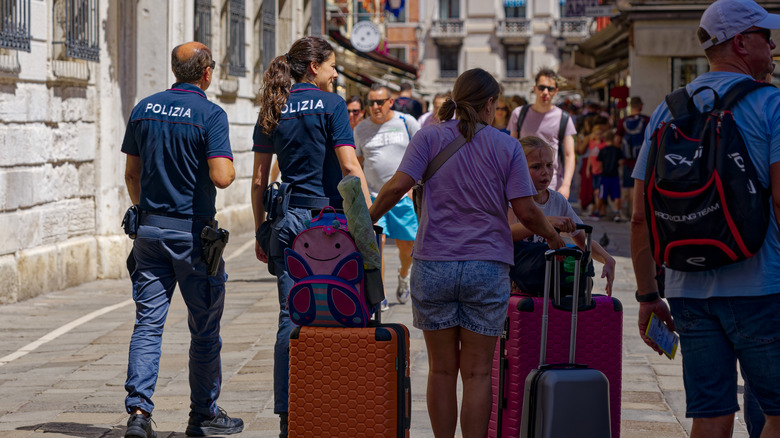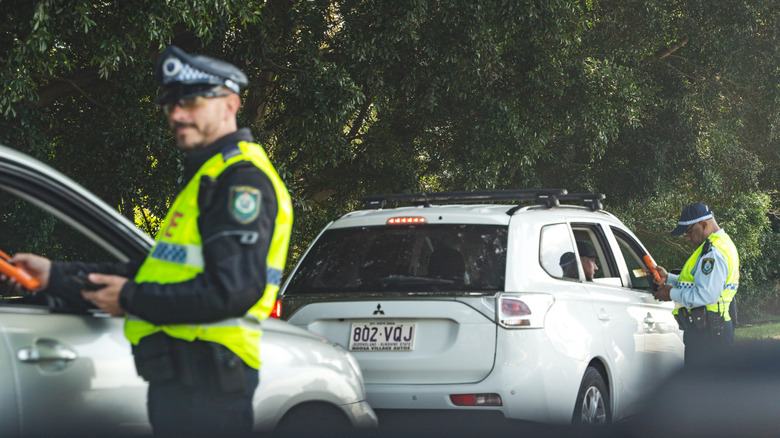The Dangerous Tourist Scam To Look Out For While Traveling Internationally
While international travel can be an empowering event, it can also leave travelers feeling anxious and powerless — especially if they become victims of scams that prey on trust. From spoofed websites to fake public Wi-Fi at the airport, today's scammers use different impersonation tactics to prey on unsuspecting travelers. While these tactics are often used to conduct cyber attacks, another common impersonation scam hits victims on a personal level, targeting a major fear of many travelers worldwide: getting in trouble with the police and being locked up abroad.
In nearly every corner of the world, criminals are increasingly posing as immigration officers, police officers, and "tourist police" to try and rob or extort money from foreigners. These scams commonly happen on the street, in public transportation centers, or around bars at night, where criminals will stop a traveler, quickly flash an ID or badge, and ask to check their documentation or money. And, when you comply, they will likely keep their hands on whatever they've checked. One dastardly version of the scam even uses a person in distress as bait.
Similar to Rick Steves' expert advice on not getting pickpocketed, one of the best ways to avoid getting scammed is to be aware of your surroundings when you go out, and carry only the essentials on your person — including a copy of your passport and visa in a money belt. If a person dressed as a police officer or an "undercover police officer" stops you for a document check, ask them to go to a well-lit area, as well as how to find the nearest official police station. If they start to back off, you might have just run into a dupe, which means you'll want to try and find a safe place to call the real police.
Protecting yourself from fake police scams
Whether a scammer is going for your money by selling you junk, snatching your wallet directly from your pocket, or scaring you into giving it up, they often target unsuspecting victims who have let their guard down. As such, one way to help protect yourself from fake police scams is to research your destination country in depth before leaving home. That way, you'll be more aware of potential risks and threats that can derail your trip.
If you're traveling to Italy, for example — in addition to carving out your iconic Tuscan road trip itinerary through medieval cities — spend some time learning about Italian police agencies' uniforms, roles, where they patrol, and how fines work. Around luxury shops and tourist areas, for example, you may encounter the Guardia di Finanza, which protects the intellectual property of Italian companies as well as prosecute financial crimes, among others. Although they typically wear gray uniforms, some officers may be undercover and have asked tourists for their ID and receipts in the past, which they are allowed to do under Italian law. To avoid any issues, we recommend you always request and keep a receipt of your transactions to protect yourself from being wrongfully accused by the Guardia di Finanza or scammed by a criminal posing as them.
In some countries, fake and even corrupt police officers see a foreigner as a payday. If you are stopped by one looking for a bribe, speak in English, be polite, and try to break the ice. They are likely trying for a quick buck, and lashing out can get you in more trouble. Another great way to scare them off is to show them you're calling your embassy's emergency number for help, which will likely send them running.
More tips on dealing with the law as a foreigner
Fake police run-ins aside, there's always the risk that you might have to deal with the law while traveling — especially if you're not totally aware of how certain rules or customs work outside of your country. As such, one of the most important things to keep in mind while traveling abroad is that certain local laws may be more or less strictly enforced than back home. For example, local police may have the authority to ask for your identification, and authorities may even set up legal roadside checks to check the vehicle's occupants or test the blood alcohol content of the driver. In cases like these, you might want to make sure you have a valid international driving permit, and that you're aware of any traffic laws that you might unconsciously break — including speeding, wearing seatbelts, and mobile phone use behind the wheel.
Additionally, if you are planning to travel to a country for a longer period of time, or if you plan to work while you're there, be sure to follow all of the conditions of your visa. Otherwise, you might get slapped with a fine and potential deportation. For example, due to many tourists behaving badly, immigration officers in Bali are currently cracking down on foreigners who are in violation of their visa conditions. Ultimately, if you're planning on house sitting, volunteering, or even doing something unpaid, always check your destination's immigration and visa laws carefully to ensure you're complying.


